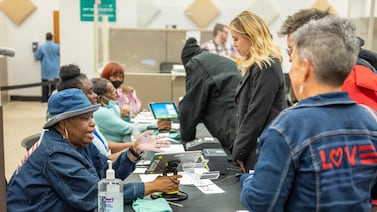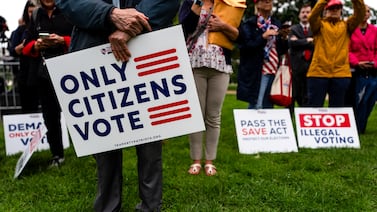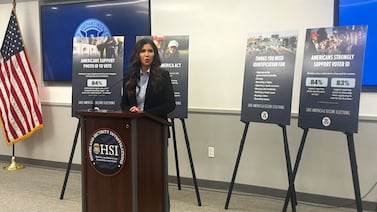Votebeat is a nonprofit news organization reporting on voting access and election administration across the U.S. Sign up for Votebeat Pennsylvania’s free newsletter here.
Pennsylvania told the U.S. Justice Department that it will not give federal officials a version of the state’s voter rolls that contains personal information, rebuffing a request from the agency.
“This request, and reported efforts to collect broad data on millions of Americans, represent a concerning attempt to expand the federal government’s role in our country’s electoral process,” Secretary of the Commonwealth Al Schmidt said in a letter Thursday responding to the request.
Schmidt, a Republican, said that his department could provide a public version of the voter rolls, known as the Full Voter Export, which contains information such as name, age, address, and vote history, but that it was prohibited by law from providing voters’ Social Security and driver’s license numbers.
Earlier this month, the department asked Pennsylvania for a copy of its voter rolls, as well as for information on answers it provided to a national election survey. Last week, the Justice Department sent a follow-up letter to clarify that it was seeking the version of the rolls containing personally identifiable information.
Such letters have gone out to states around the country, and officials have specified recently that the requests include voters’ Social Security and driver’s license numbers.
It is unclear how far the Justice Department may be willing to press the issue. It recently sued Orange County, California, in part for redacting driver’s license and Social Security numbers when responding to a department request for voter registration information.
Some local groups have criticized the requests. In a statement Tuesday, Lauren Cristella, president of the Philadelphia-based government watchdog group Committee of Seventy, said that the recent requests from the Justice Department, along with recent statements from President Donald Trump on mail voting clearly seem to be “an attempt to sow doubt in our elections ahead of the 2026 midterms.”
The original letter from federal officials also sought information about answers Pennsylvania gave to the Election Administration and Voting Survey, among other things.
On Monday the Department of State responded to those portions of the letter, in some cases saying the questions appeared to be based on misunderstandings or mistakes about the data.
Read Votebeat and Spotlight PA’s previous coverage on the state’s communication with the Justice Department:
- Justice Department widens its request for Pennsylvania election information
- U.S. Justice Department peppers state election officials with data requests to enforce Trump directives
- U.S. Justice Department presses Pennsylvania for answers on how it manages voter rolls
Carter Walker is a reporter for Votebeat in partnership with Spotlight PA. Contact Carter at cwalker@votebeat.org.





